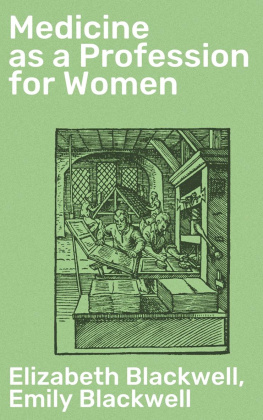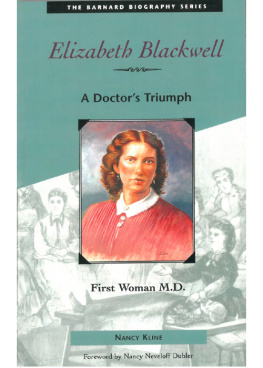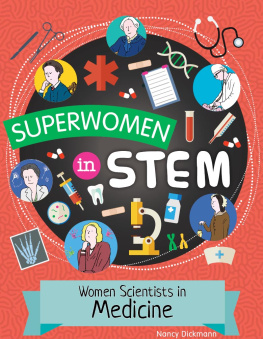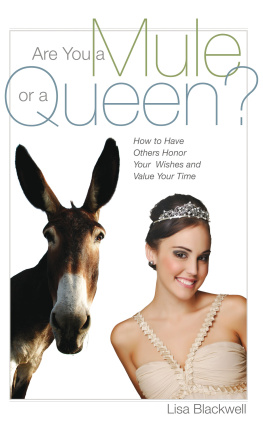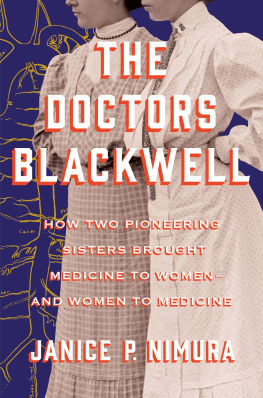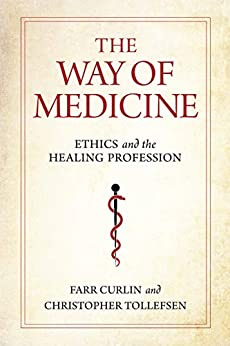Medicine
Table of Contents
as a
Profession for Women.
Table of Contents
New York:
Printed for the Trustees of the
New York Infirmary for Women.
1860.
Medicine
Table of Contents
as
a Profession for Women. [1]
In inviting consideration to the subject of medicine as an occupation for women, it is not a simple theory that we wish to present, but the results of practical experience. For fourteen years we have been students of medicine; for eight years we have been engaged in the practice of our profession in New York; and during the last five years have, in addition, been actively occupied in the support of a medical charity. We may therefore venture to speak with some certainty on this subject; and we are supported by the earnest sympathy of large numbers of intelligent women, both in England and America, in presenting this subject for the first time to the public.
The idea of the education of women in medicine is not now an entirely new one; for some years it has been discussed by the public, institutions have been founded professing to accomplish it, and many women are already engaged in some form of medical occupation. Yet the true position of women in medicine, the real need which lies at the bottom of this movement, and the means necessary to secure its practical usefulness and success, are little known. We believe it is now time to bring this subject forward and place it in its true light, as a matter not affecting a few individuals only, but of serious importance to the community at large; and demanding such support as will allow of the establishment of an institution for the thorough education of women in medicine.
When the idea of the practice of medicine by women is suggested the grounds on which we usually find sympathy expressed for it are two. The first is, that there are certain departments of medicine in which the aid of women physicians would be especially valuable to women. The second argument is, that women are much in need of a wider field of occupation, and if they could successfully practice any branches of medicine it would be another opening added to the few they already possess. In some shape or other, these two points are almost universally regarded (where the matter has been considered at all) as the great reasons to be urged in its behalf.
Now, we believe that both these reasons are valid, and that experience will fully confirm them; but we believe also that there is a much deeper view of the question than this; and that the thorough education of a class of women in medicine will exert an important influence upon the life and interests of women in general, an influence of a much more extended nature than is expressed in the above views. The question of the real value to the community of what women may do in medicine is an eminently practical matter, for upon it is based the aid which they may ask for its accomplishment; and upon the position of women in medicine depends the kind and extent of education which should be given to fit them for it. A great deal of well-meant effort has been, and is still being expended upon the institutions which have been established for this purpose. Sometimes we have heard much discouragement expressed at the slight result that has followed from them; while, on the other hand, it is often said, "after all, it is a matter for women to settle for themselves, if they can be doctors, and want to, they will find the way to do it, there is no need of doing any thing in the matter." Now as I have said, we believe it to be by no means a matter concerning only the limited number of women who may be actually engaged in the pursuit itself; and it is also certain that to insure the success of the work it is not enough that women should wish to study, the coperation and support of public sentiment is needed to enable them to do so. We hope, by showing the value of the work, to prove it to be the interest of the community to carry it out; and we desire to show the means by which this may be done.
Let me then say a few words on the influence which would be exerted on society by the opening of medicine as a profession to women. The interests and occupations of women, as they actually are at present, may be referred to four distinct forms of effort:Domestic life; the education of youth; social intercourse, and benevolent effort of various kinds. All these avocations, by unanimous consent, are especially under the superintendence of women, and every woman, as she takes her place in society, assumes the responsibility of participation in some of them.
While these pursuits have always formed the central interest of the majority of women, their character, and the requirements which they make for their proper performance, have widened, with the advance of modern society, in a remarkable degree. Social intercoursea very limited thing in a half civilized country, becomes in our centres of civilization a great power, establishing customs more binding than laws, imposing habits and stamping opinions, a tribunal from whose judgment there is hardly an appeal. All who are familiar with European life, and the life of our great cities, know what an organized and powerful force it ever tends to become.
In like manner, benevolent efforts have little influence in new countries, but in Europe, especially in England, the extent of such work, and the amount of it which is done by women would be incredible, did we not see here, in our midst, the commencement of a similar state of things.
Domestic life is not less affected by the growth of the age; the position and duties of the mother of a family call for very different qualifications, in the wide and complicated relations of the present, from what was needed a century ago.
Now it is evident that the performance of all these forms of work, extended and organized as they are, is in its practical nature a business requiring distinct knowledge and previous preparation, as much as actual trades and professions. This fact would be more commonly recognized were it not that there is so much moral and spiritual life interwoven into womans work by the relations upon which it is founded, and out of which it grows, as to make it more difficult to separate this business aspect of her work from her personal life, than is the case with the business life of men; consequently its practical character is too often considered entirely subordinate, or lost sight of. Every woman, however, who brings thought and conscience to the performance of everyday duties, soon realizes it in her own experience. The wider the view she takes of life, the higher her ideal of her domestic and social relations, the more keenly she will feel the need of knowledge with regard to this matter of fact basis upon which they rest. The first and most important point in which she will feel the want of this previous training will be in her ignorance of physiological and sanitary science, in their application to practical life; of the laws of health and physical and mental development; of the connection between moral and physical conditions, and the influences which our social and domestic life exert upon us. These and similar questions will meet her at every step, from the commencement of her maternal life, when the care of young children and of her own health bring to her a thousand subjects of perplexity, to the close of her career, when her children, assuming their positions as men and women, look to her as their natural counsellor.


